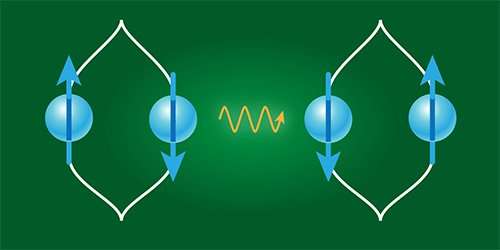March 12, 2018 report
A possible experiment to prove that gravity and quantum mechanics can be reconciled

Two teams of researchers working independently of one another have come up with an experiment designed to prove that gravity and quantum mechanics can be reconciled. The first team is a pairing of Chiara Marletto of the University of Oxford and Vlatko Vedral of National University of Singapore. The second is an international collaboration. In the papers, both published in Physical Review Letters, the teams describe their experiment and how it might be carried out.
Gravity is a tough nut to crack, there is just no doubt about it. In comparison, the strong, weak and electromagnetic forces are a walk in the park. Scientists still can't explain the nature of gravity, though how it works is rather well understood. The current best theory regarding gravity goes all the way back to Einstein's general theory of relativity, but there has been no way to reconcile it with quantum mechanics. Some physicists suggest it could be a particle called the graviton. But proving that such a particle exists has been frustrating, because it would be so weak that it would be very nearly impossible to measure its force. In this new effort, neither team is suggesting that their experiment could reconcile gravity and quantum mechanics. Instead, they are claiming that if such an experiment is successful, it would very nearly prove that it should be possible to do it.
The experiment essentially involves attempting to entangle two particles using their gravitational attraction as a means of confirming quantum gravity. In practice, it would consist of levitating two tiny diamonds a small distance from one another and putting each of them into a superposition of two spin directions. After that, a magnetic field would be applied to separate the spin components. At this point, a test would be made to see if each of the components is gravitationally attracted. If they are, the researchers contend, that will prove that gravity is quantum; if they are not, then it will not. The experiment would have to run many times to get an accurate assessment. And while a first look might suggest such an experiment could be conducted very soon, the opposite is actually true. The researchers suggest it will likely be a decade before such an experiment could be carried out due to the necessity of improving scale and the sensitivity involved in such an experiment.
More information: C. Marletto et al. Gravitationally Induced Entanglement between Two Massive Particles is Sufficient Evidence of Quantum Effects in Gravity, Physical Review Letters (2017). DOI: 10.1103/PhysRevLett.119.240402 , arxiv.org/abs/1707.06036
ABSTRACT
All existing quantum-gravity proposals are extremely hard to test in practice. Quantum effects in the gravitational field are exceptionally small, unlike those in the electromagnetic field. The fundamental reason is that the gravitational coupling constant is about 43 orders of magnitude smaller than the fine structure constant, which governs light-matter interactions. For example, detecting gravitons—the hypothetical quanta of the gravitational field predicted by certain quantum-gravity proposals—is deemed to be practically impossible. Here we adopt a radically different, quantum-information-theoretic approach to testing quantum gravity. We propose witnessing quantumlike features in the gravitational field, by probing it with two masses each in a superposition of two locations. First, we prove that any system (e.g., a field) mediating entanglement between two quantum systems must be quantum. This argument is general and does not rely on any specific dynamics. Then, we propose an experiment to detect the entanglement generated between two masses via gravitational interaction. By our argument, the degree of entanglement between the masses is a witness of the field quantization. This experiment does not require any quantum control over gravity. It is also closer to realization than detecting gravitons or detecting quantum gravitational vacuum fluctuations.
Sougato Bose et al. Spin Entanglement Witness for Quantum Gravity, Physical Review Letters (2017). DOI: 10.1103/PhysRevLett.119.240401 , arxiv.org/abs/1707.06050
ABSTRACT
Understanding gravity in the framework of quantum mechanics is one of the great challenges in modern physics. However, the lack of empirical evidence has lead to a debate on whether gravity is a quantum entity. Despite varied proposed probes for quantum gravity, it is fair to say that there are no feasible ideas yet to test its quantum coherent behavior directly in a laboratory experiment. Here, we introduce an idea for such a test based on the principle that two objects cannot be entangled without a quantum mediator. We show that despite the weakness of gravity, the phase evolution induced by the gravitational interaction of two micron size test masses in adjacent matter-wave interferometers can detectably entangle them even when they are placed far apart enough to keep Casimir-Polder forces at bay. We provide a prescription for witnessing this entanglement, which certifies gravity as a quantum coherent mediator, through simple spin correlation measurements.
Journal information: Physical Review Letters
© 2018 Phys.org




















